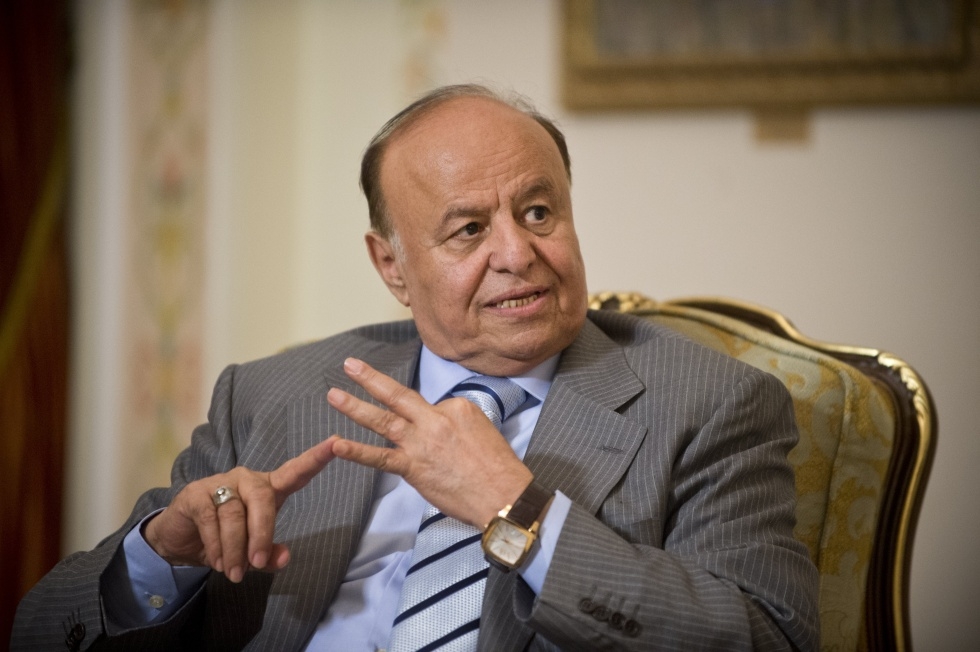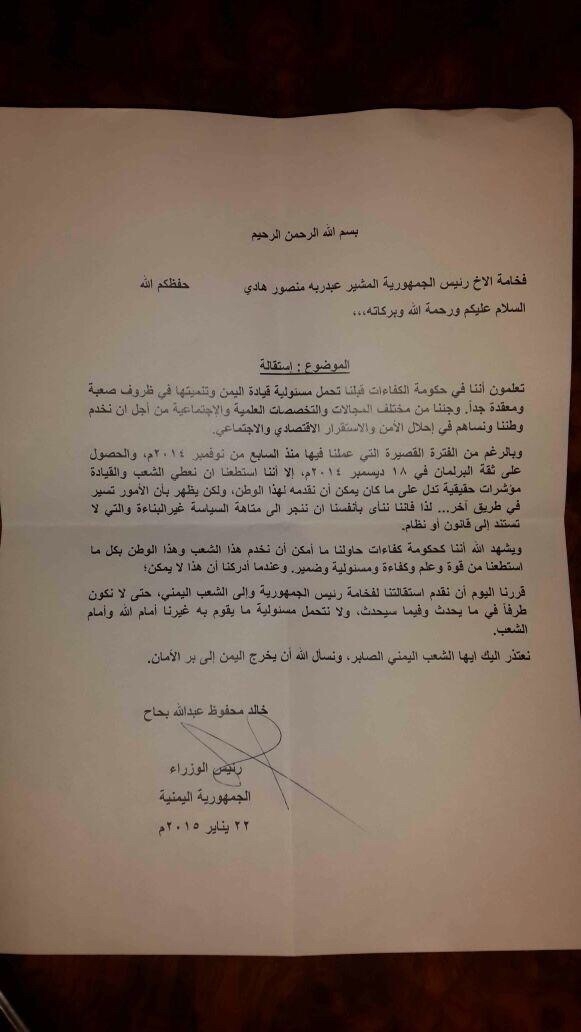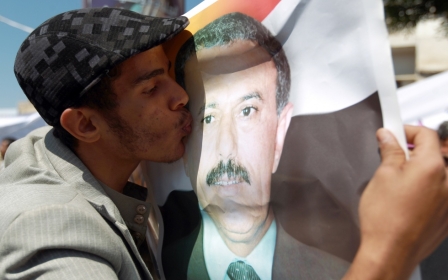Yemen's president steps down, cabinet resigns

Yemeni President Abd Rabbuh Mansur Hadi has offered his resignation, days after Houthi rebels seized the country's presidential palace.
The country's parliament has reportedly rejected the resignation and Yemeni observers said it was still possible Hadi might reconsider.
"I believe the Saudis, as well as the US and the UN, through the offices of [UN Envoy] Jamal Ben Omer, will encourage Hadi to reconsider his resignation," said Yemen analyst Jane Novak. "It is within the range of possibility that he will reverse his decision."
Hadi stepped down less than an hour after the country's Prime Minister Abdullah Khaled Mahfouz Bahah announced that he and the rest of Hadi's cabinet had resigned.
In a post on Facebook, Bahah said it had become clear to the government that their job was 'impossible'.
"When we realised that [our work to help Yemen] was impossible, we decided to give our resignation to the president of the republic and the people of Yemen because we don't want to be part of what is happening or take responsibility for what others are doing," the post reads.
"We regret that it has come to this and we apologise to you, the patient people of Yemen, and pray that God will sail Yemen to stability and safety."
The Bahah government - described in his resignation letter as a "government of professionals" - was assembled in November and affirmed by a parliamentary vote of confidence the following month.
The resignation comes as Shiite Houthi militias maintained their grip on the capital city of Sanaa, with fighters deployed around the presidential palace, holding the president under virtual house arrest.
A nine-point deal, struck between the Houthis and the government on Wednesday, pledged the Shiite militants to relinquish control of government buildings seized earlier this week after two days of violence that left 35 people dead.
However, there have been no moves made by the group to withdraw, despite an agreement by the government to make concessions over a disputed draft constitution for the country.
The Houthis have also held chief of staff Ahmed Awad bin Mubarak since Saturday - his release was specified as part of Wednesday's truce deal.
'Nothing is ever final'
In a Sanaa cornershop, MEE contributor Celeste Loughlin watched as a customer told a shopkeeper that Hadi has resigned, causing the shopkeeper to erupt in laughter at the ridiculousness of the situation.
"His eyes almost popped out," said Loughlin said.
Many Yemenis in Sanaa told MEE that even though they felt that Hadi resigned a long time ago, his official resignation took them aback.
"The government's resignation didn't surprise me, but Hadi's was shocking," said Abdo al-Fageeh, a 39-year-old entrepreneur. Al-Fageeh said he thought Hadi might be "playing a game" with his resignation to apply pressure to the Houthis to back off.
"Nothing is ever final in Yemen," he said. "Everything is a game."
Local Houthi supporter Ahmed Mohammed Hassan, who works for a local NGO, said Hadi's resignation would create a power vacuum and blamed all political parties for not working together.
"They [Houthis] have a big challenge now," Hassan said. "There won't be a better future unless everyone works together."
Power vacuum
In reaction to Hadi's resignation, a Houthi spokesman reportedly said on Thursday evening that the group would like Bahah's government to continue its work.
"The Houthis don't want to take executive power," said Jane Novak, a Yemeni analyst. "They could have challenged Hadi in September when they moved into Sanaa or at any point since."
Many have also speculated that losing Hadi could provide an opportunity for al-Qaeda in the Arabian Peninsula (AQAP) to assert itself.
"[AQAP] couldn't care less about political ramifications as much as the instability this would create," said Hisham Omeisy, a Yemeni analyst. "They will prosper in a vacuum of state absence."
Omeisy said Saudi Arabia, Yemen's neighbour, will be concerned by the potential for a Shiite monopoly on power in the country and the loss of regional security.
"Saudi Arabia hates any headache coming from Yemen, especially one relating to instability and loss of control, which translates into more militant groups like AQAP being able to launch attacks on Saudi," he told MEE.
"They will try to intervene heavily to sustain some form of government and control out of fear for their own security."
Leaked conversations
Yemen has been wracked by instability since the resignation of former President Ali Abdullah Saleh in 2012, following anti-government protests.
A leaked phone conversation allegedly between Yemen's former president Ali Abdullah Saleh and a Houthi leader suggests that the Shiite militia have been coordinating militarily and politically with the country's autocratic ex-leader to undermine the current elected government.
The leaked conversation, aired by Al Jazeera on Wednesday night, reportedly took place in October, less than a month after the Houthi militants took control of the capital Sanaa and other cities.
The Houthi in question was Abdul Wahid Abu Ras, who represented the militant group in the country's national dialogue conference.
"This confirms some of the accusations against Saleh," said Hashem Ahelbarra, a Middle East correspondent for Al Jazeera English who has reported extensively from Yemen. In November, the United Nations imposed sanctions on former president Ali Abdullah Saleh, accusing him of plottinhg with the Houthis to destabilise Yemen.
"In the phone conversation, we hear [Saleh] talking to Abdul Wahid Abu Ras, who is a top Houthi military commander, asking him about how to coordinate moves in the future … and the top military commander was all the time saying 'Yes, sir. It shall happen'," Ahelbarra added.
- See more at: http://www.middleeasteye.net/news/yemen-leak-collusion-between-houthis-and-ex-president-saleh-1125273454#sthash.hFykA5ww.dpufA leaked phone conversation allegedly between Saleh and a Houthi leader, aired by Al Jazeera on Wednesday night, suggests that the Shiite militia have been coordinating militarily and politically with the country's autocratic ex-leader to undermine the current elected government.
The leaked conversation reportedly took place in October, less than a month after the Houthi militants took control of the capital Sanaa and other cities.
The Houthi in question was Abdul Wahid Abu Ras, who represented the militant group in the country's national dialogue conference.
"This confirms some of the accusations against Saleh," said Hashem Ahelbarra, a Middle East correspondent for Al Jazeera English who has reported extensively from Yemen. In November, the United Nations imposed sanctions on Saleh, accusing him of plotting with the Houthis to destabilise Yemen.
"In the phone conversation, we hear [Saleh] talking to Abdul Wahid Abu Ras, who is a top Houthi military commander, asking him about how to coordinate moves in the future … and the top military commander was all the time saying 'Yes, sir. It shall happen'," Ahelbarra added.
Celeste Loughlin contributed to this report.
Middle East Eye propose une couverture et une analyse indépendantes et incomparables du Moyen-Orient, de l’Afrique du Nord et d’autres régions du monde. Pour en savoir plus sur la reprise de ce contenu et les frais qui s’appliquent, veuillez remplir ce formulaire [en anglais]. Pour en savoir plus sur MEE, cliquez ici [en anglais].





